When The Hot Wing King won the Pulitzer Prize for Drama in 2021, the award committee described it succinctly as “a funny, deeply felt consideration of Black masculinity and how it is perceived, filtered through the experiences of a loving gay couple and their extended family as they prepare for a culinary competition.” That consideration of Black masculinity is significantly augmented by the character of Isom, a gender-nonconforming gay cis male whom the brilliant local actor Michael Kevin Darnall plays in teal blue hair.
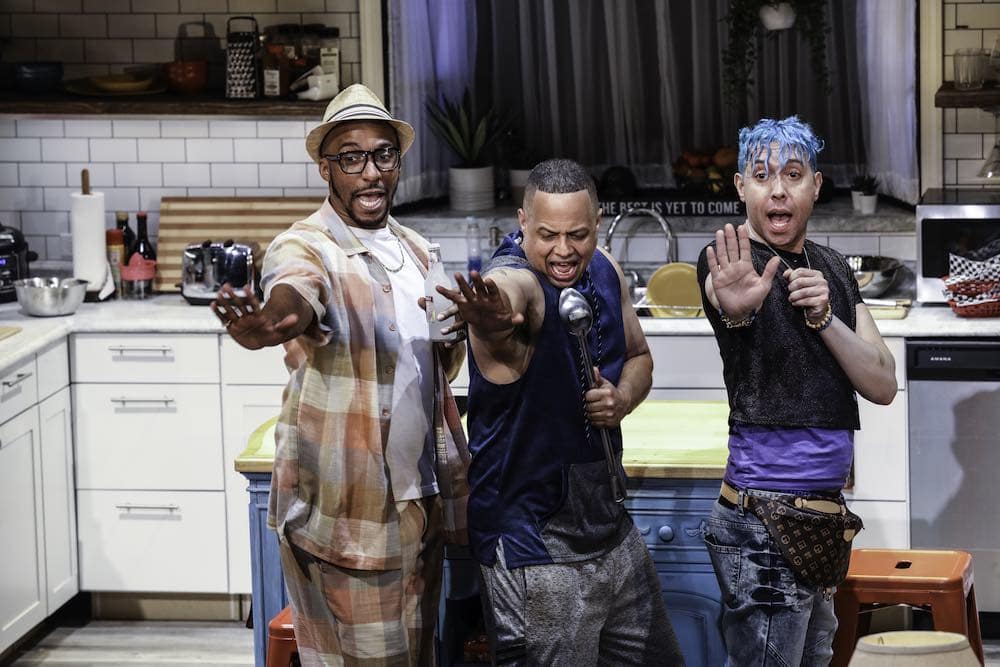
I last interviewed Michael in 2018, and he spoke then very personally about how the women in his life inspired the extraordinary openness and sensitivity that I had seen him bring to the roles he plays. After I saw his arrestingly expressive portrayal as Isom in Katori Hall’s The Hot Wing King — just extended through August 7 at Studio Theatre — I knew I wanted to talk with him again.
In a candid phone conversation one recent morning, I asked him about his fascinating role and performance and the hilarious and powerful play itself. (The interview has been edited for clarity and length.)
John: Who is Isom and how does he fit into the Hot Wing King ensemble?
Michael: Isom is the newest member of the New Wing Order, which is a tight-knit group of friends who enter an annual hot wing contest. We are led by Cordell [Brian Marable], who I met in church, along with his partner, Dwayne [Blake Morris]. I am the choir director, I know Dwayne from singing in the choir, and I somehow got roped into this hot wing king thing. The four of us — Dwayne, Cordell, Big Charles [Bjorn DuPaty], and Isom — we sort of are our own Black gay male version of The Golden Girls in Memphis.
When you first read the play and when you were in rehearsal for the role, how did you come to understand the character?
Isom just really bounced off the page for me. He immediately clicked. I didn’t necessarily get all of his pop cultural references, but I could hear my relatives, I could hear my family. I could specifically hear my mother.
The show is set in Memphis, Isom is from New Orleans, but the root of my character comes from my upbringing. My Black mother raised me here in the DMV. On top of that, I’ve layered New Orleans and Memphis and MTV culture, where our accents don’t always reflect where we’re from because we watch so much television. The wonderful Caroline Stefanie Clay, who was our dialect coach, helped me with some really delicious things.
Curiously, when I was approached about this play over a year ago by Studio, they asked me to read for the character of TJ, now played so beautifully by my dear friend JaBen Early. Those two parts [Isom and TJ] are on the direct opposite ends of the spectrum of male masculinity. We talked about that in the [rehearsal] room: that these men follow along a wide spectrum of what it is to be masculine or feminine while being cisgender male. Even in terms of our complexions, we’re Black men of all shades. So our show really touches upon a lot in terms of the spectrum Katori Hall has written and how we’ve been cast.
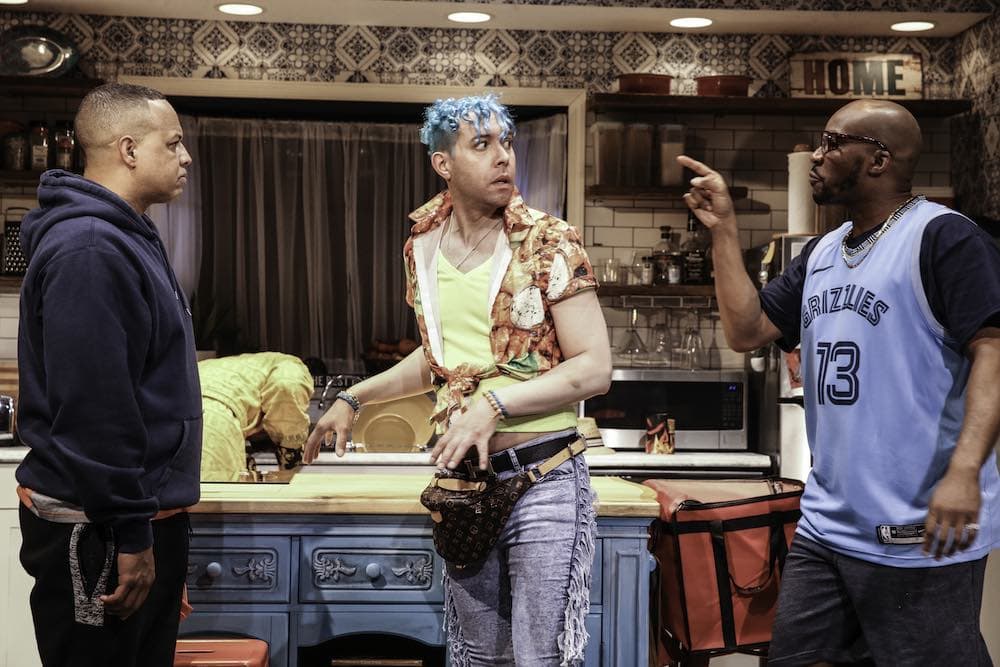
The director, Steve H. Broadnax III, who also directed the New York production, was so close to the play’s process from conception to the stage that Katori Hall has called him the play’s doula. And he, like four of the six characters in the play, identifies as same-gender-loving. With a director who had such intimate knowledge of the play, what were rehearsals like?
Steve is such a lovely man and just brilliant. He’s so incredibly intelligent and in tune with this play, and he created such a safe, warm, encouraging space. We started every rehearsal day by checking in. We all went around, not just the actors, but everyone in the production who was in the room. If the understudies were at rehearsal, everyone in that room circled up. And one by one we shared where we were that day, how we were feeling, what was on our mind, what revelations we had about the play the night before or on the way to rehearsal. And at the end of every check-in, we put our hands into the center of the circle, one on top of the other, and we shouted PLAY! — because that’s what we do. And we ended every day by circling up again. We once again checked in and shared our reflections of the day. And then we put our hands in that circle and said in unison [quoting a line from the play], “This is Katori Hall’s Hot Wing King — BOCK!!! BOCCCCCKKKKKK!!!!”
Isom has some drop-dead hilarious lines and your physicality in the play is in the best sense scene-stealing. When Isom has the focus, it’s like there’s nothing else on stage to watch.
The teal hair helps.
From Isom’s point of view inside the play, why are you there and what is Hot Wing King about?
I’m the one character who’s described as being from a different place, a NOLA boy who made the trek up to live in Memphis and work in the Metropolitan Baptist Church. And I think of Isom as someone who found a new family. As we prepare the marinade [for the hot wing competition], he’s given not the most fun task as the one who literally stirs the pot. And you notice he doesn’t leave. A lot is going on in that house, and Isom’s the only one who mans his position. I think that speaks to his love for this group, and his desire to be a part of this found family. I think that’s what it’s really about for him.
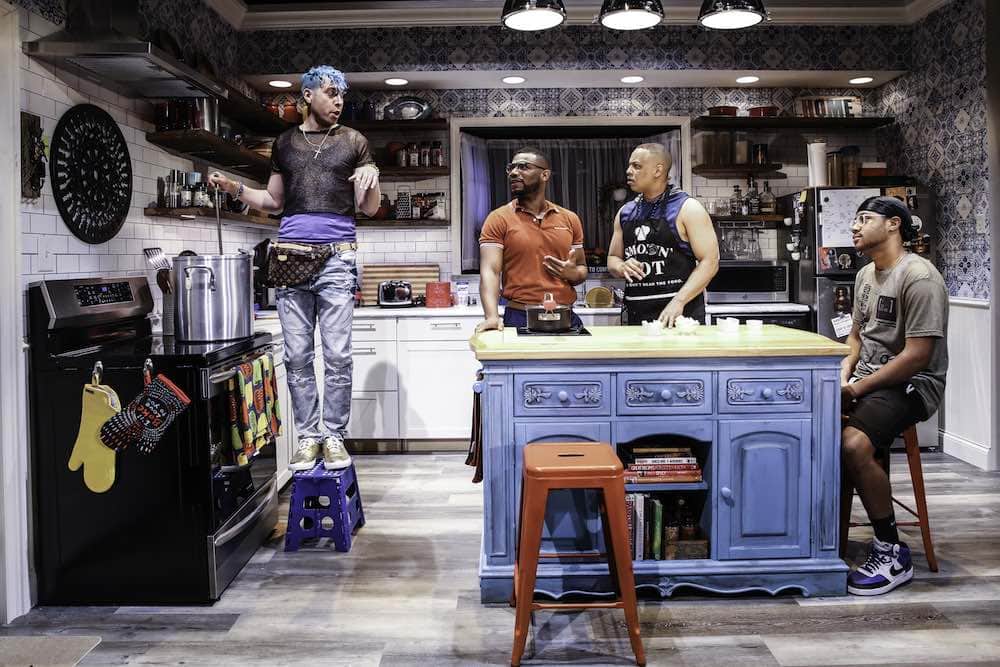
I found Katori Hall’s script as interesting for what’s in it as for what’s not. For instance, among the Black male characters, Isom is by far the least masculine-presenting.
Absolutely.
Yet the script has no hint of femphobia in the way other characters regard Isom. Like that’s a trope that Hall just doesn’t go with. Isom is really accepted in the family and there isn’t an issue about his gender nonconforming.
I would agree to an extent. Big Charles, who has a romantic or at least a sexual past with Isom, has a couple of lines about how Isom is just too much. And Isom has a line about being good enough for a one-night stand, but all of his personality, for some people, can be a little too much.
But it comes across as Big Charles’ self-questioning; it doesn’t come across as hostility toward Isom.
Yes, I would agree. We’re all in a very safe space in that home. We even try to create a safe space for Dwayne’s nephew, EJ [Derrick Sanders III], who enters unexpectedly.
There are three offstage characters who are women: Dwayne’s deceased sister, who was his nephew Everett’s mother; the woman Cordell is divorcing, who is the mother of his two sons; and Isom’s mother, whose wisdom Isom often quotes. We learn that Dwayne feels he failed his sister by calling the police, and we learn that Cordell feels he failed his wife by not telling her the truth about his sexuality. And I noticed that Hall hasn’t given any of the men any lines that refer to those offstage women disparagingly, no sexist slurs, just respect. Like that’s another trope that Hall conspicuously avoids. Is that your sense of those women in the play as well?
Absolutely. All of the women mentioned in the play are treated with respect and that’s actually one of the things that I brought up in a very early rehearsal. It’s very easy to focus on Black boy joy and those aspects of the play, but I said that something very interesting about this play are these female characters who are unseen but so pivotal. Jelissa [Everett’s mother and Dwayne’s sister] is reflective of very real incidents that have happened in the last couple of years in terms of police violence on Black people, Black women, in particular. Isom always mentions his mother. I mean, that is just me all day every day. My mother passed away in 2008, but I talk about my mother all the time. She is my everything and in everything that I do. So yeah, the play is also a love letter to women. We’re not leaving women out.
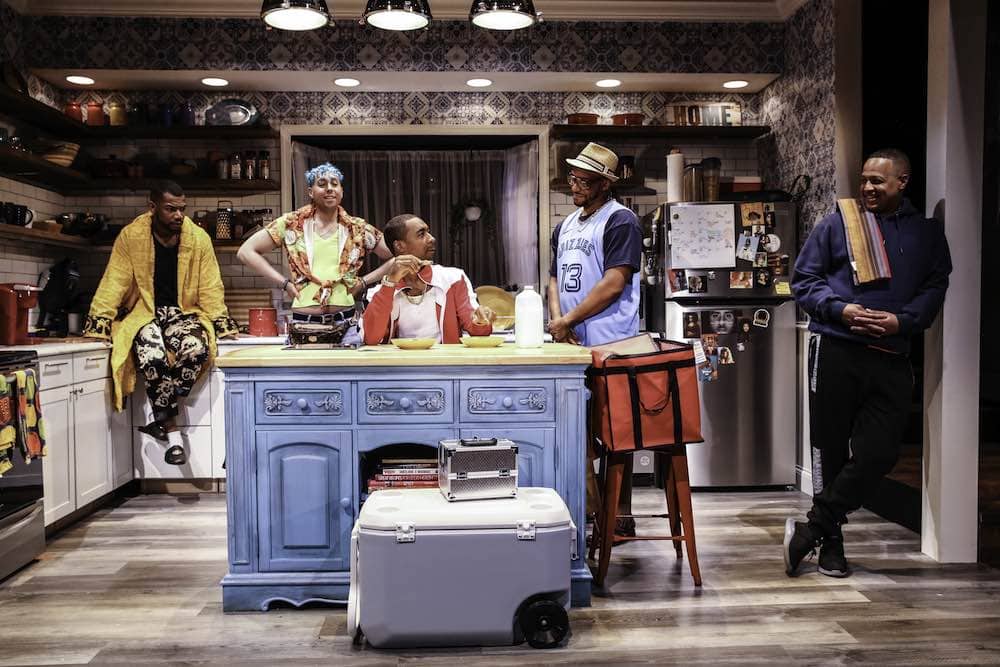
The characters use the b-word and the n-word to refer to one another a lot—more frequently than white ears may be used to hearing. Would you talk about how those words function in the play?
You’re absolutely right. A lot of people who are not Black are not accustomed to hearing those words used as liberally as they are in this play. Even among Black people, not all of us are comfortable with those words, and not all of us use those words in our everyday conversations, but some of us do. And just like some of our pop cultural references you may not get, you may not get why these men are so comfortable to say bitch and nigga around each other, but that’s not for you to get necessarily, that’s not for you to judge. Among Black people, the n-word is a word that we’ve had to reappropriate and give its own power within our intimate circles. So yeah, it’s not always gonna be comfortable to every ear, but it is a reality, and it happens in this world, and it may not be for you, but that’s okay.
There’s a kind of celebratory Black cultural centricity to the play. Hot Wing King is a story about Black people, not a story about being Black. White people aren’t referred to. If there is a white gaze among theatergoers, Hot Wing King makes no concession to it. But there are multiple entry points for a Black theatergoer to relate to the play. How did that fact come up in rehearsal, and how has that influenced how the play is performed and received?
Yeah, we certainly are cognizant of the theatergoing audience, but in my experience, there are too many Black people in this country who feel like theater is not for them because they’ve never seen themselves reflected on the stage. And we are doing that with this show at Studio. We realize that the majority of people who are going to see this play are white and they’re not gonna get everything. They’re not gonna feel comfortable with everything. But, you know, people of color, we’ve been seeing theater for years and years, and we’ve had to make concessions and try to find ourselves on stage in the humanity of white cis playwrights. So why can’t the opposite occur? Why can’t people try to find our humanity and our joy, our bliss, in being who we are?
Running Time: Two hours 10 minutes including a 15-minute intermission.
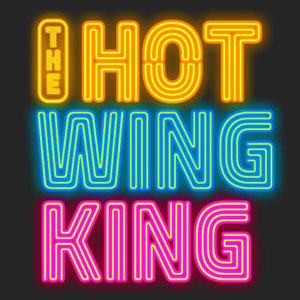
The program for The Hot Wing King is online here.
COVID Safety: Proof of vaccination (or a negative COVID test) and facemask are required. Studio Theatre’s complete Health and Safety protocols are here.
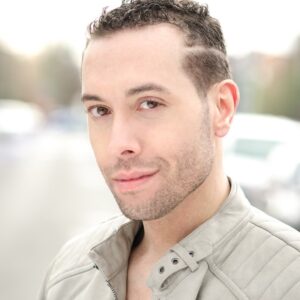
Michael Kevin Darnall returns to Studio Theatre having appeared in Wig Out! and Animal. Other theater credits include Jitney at Cincinnati Playhouse in the Park; One Man, Two Guvnors at Chautauqua Theater Company; Jefferson’s Garden and A Christmas Carol at Ford’s Theatre; and Father Comes Home From the Wars (Parts 1, 2, & 3) at Round House Theatre. Other credits include The 39 Steps at RhinoLeap Productions, Ulysses on Bottles at Mosaic Theater Company, and Yentl at Theater J. Michael is a frequent collaborator with MetroStage and Constellation Theatre Company, and a company member at The Hub Theatre. On television, he appeared in HBO’s The Wire. Michael is a five-time Helen Hayes Award nominee and received his BFA in Acting at SUNY Purchase Conservatory of Theatre Arts.
SEE ALSO:
The love of Black men for each other heats ‘The Hot Wing King’ at Studio (review by Gregory Ford)
Actor Michael Kevin Darnall Opens Up About Being Open on Stage (interview by John Stoltenberg, October 21, 2018)




